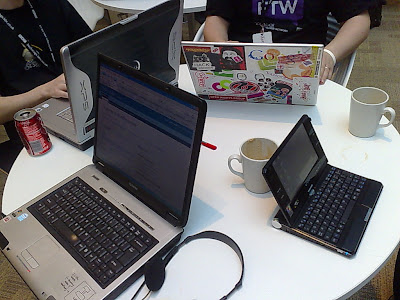BarCamp London dim sum challenge
Monday, April 21, 2008Add this post to Del.icio.us, Digg or Furl | Create Watchlist
Are you going to be poised at your computer at 11 am on Thursday 24 April?
If so, please do me a favour - sign me up for BarCampLondon4, and I'll not only be eternally grateful but I'll also buy you a dim sum or other lunch, tea & cakes, or drinks, as you prefer. (My name you know, my email you'll know from my sidebar.) The downside - it'll have to be with me. But I think you already knew that...
Is this against the rules? I don't know, but what I do know is that for popular BarCamps like this one, it's virtually impossible to get a place unless you're ready at the right nanosecond at a computer with a decent speed connection (or can write a script to do the sign up for you, of course). If you work and are in a meeting at that time, tough luck.
It's even worse if the sign up slots are scheduled, as GCap Media (who are organising this BarCamp) have done, for exactly the same time on exactly the same day of the week. I was in a conference call for the first wave. For the second wave I tried using my Nokia N95 but with T-Mobile's web n crawl, I only got in just short of 11.02 am and it said that the tickets were all gone. In less than 2 minutes.
At least for BarCampLondon3 the sign ups waves were scheduled for different times of the day, on different days of the week (including weekends as I recall). So I think I managed to sign up for that during a midnight wave.
The way things are going, I haven't much hope that I'll be able to sign up this Thursday, especially as I'll only be able to try signing up via a slow mobile phone connection again.
BarCamp sign up systems - is there another way?
As you can tell, I don't think the sign up system used for London BarCamps is very fair. What would be fairer is - something else.What do I suggest? A longer sign up period rather than a few waves. Say, an opening and closing time and date - precise time/date for both - ranging over a period of about a month.
Announce those times well in advance, all over the place.
People indicate their interest during the sign up month (or week, or fortnight, if the organisers prefer - as long as there's plenty of advance notice so people know when the period will be).
After the sign up period closes, do a random selection or ballot out of those who've given their details during the sign up period (I'm sure an electronic random "pick the names out of a hat" can be done; someone can whip up software to do that surely, if it's not already been produced).
That would be the fairest way to choose attendees, I think. Or at least vary the times and days for the sign up waves.
And for the next BarCamp with the same theme in the same place, get the system to weight the draw a little in favour of those who missed out in the last draw - so that the more times you were unlucky and missed out in a row, the higher the weighting in your favour.
That's my thoughts anyway. Otherwise, the only people who'll attend are those who can be poised at their computers at exactly the right time - maybe the organisers want to only let in people who are that keen, but real life just isn't like that, I'm keen but my work has to take priority.
So, what do you think would be the fairest way to allocate places for popular BarCamps? Or a fairer way than now, at least?
And would you be willing to take up the Improbulus dim sum challenge?
| Links to this post | Post a comment or view 1 comment(s) | Subscribe to all comments on all posts







